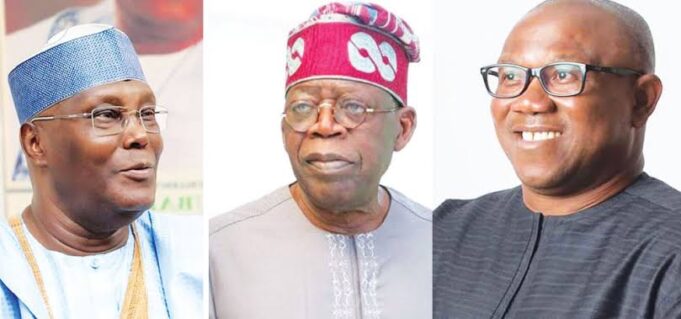The Independent National Electoral Commission (INEC) has said 95 million voters would determine President Muhammadu Buhari’s successor in the 2023 presidential election.
The INEC Chairman, Prof. Mahmood Yakubu, said this at an event organised by the National Endowment for Democracy (NED) and the International Foundation for Electoral Systems (IFES) in Washington DC, United States.
Yakubu, in a statement made available to newsmen on Thursday, described the 2023 general election as significant to Nigeria, adding that 95 million Nigerians were expected to vote in 176, 846 polling units across the country.
“The election is significant because the incumbent President is not eligible to run, this being his second and final term.
“There are 18 political parties in the race to produce the next President to be elected by 95 million voters. We had over 84 million registered voters in 2019.
“But with last Continuous Voter Registration(CVR), we are going to add at least 10 million Nigerians and that will take the Register of Voters to 95 million.
“Each time Nigeria goes to the poll, it is like the whole of West Africa voting.
“In West Africa, there are 15 countries including Nigeria. But the total number of registered voters in the 14 countries combined is 73 million.
READ ALSO: Wike: No one can stop me from calling for internal democracy in PDP
“In Nigeria, it’s going to be 95 million. So, there will be 22 million more voters in Nigeria than the whole of West Africa put together,” the INEC chairman said.
Yakubu stated that INEC has learned a lot of lessons from the 2015 and 2019 general elections as well as 103 off-cycle elections and bye-elections conducted after the 2019 general election.
The INEC chairman added that a lot of innovations have been introduced to increase transparency and ensure the credibility of the country’s electoral process.
“The new Electoral Act with its many progressive provisions has provided legal backing to the innovations.
“These innovations are now provided for and protected by law, especially those leveraging on technology to improve voter registration, voter accreditation, result management, and the promotion of inclusivity for marginalised persons such as women, youths, and persons with disability,” he said.
Yakubu said the introduction of online voter registration was part of the innovations, saying it was very helpful during the COVID-19 pandemic.
He noted that the online registration was done alongside physical registration from June 2021 to June 2022 when it lasted, saying 12,298,944 voters completed their registration.
He said the figure was more than the voter population in the Republic of Gambia, Guinea-Bissau, Liberia, Sierra Leone, and Cape Verde.
Yakubu stated that NEC has completed the cleaning up of the data of newly registered voters using the Automated Biometric Identification System (ABIS) that combine the fingerprint and facial authentication of registered voters.
The INEC chairman said those who registered twice and those who were underage or have no reason to register as provided by law have been weeded out.
READ ALSO: Court discharges, acquits ex-Gov Turaki of N8.3bn fraud
“The exercise was completed a few days ago. We have not even shared the information with Nigerians, but we have 2.7 million invalid registrants and they have been weeded out.
“We will continue to take steps necessary to protect the integrity of the Register of Voters because it is fundamental to the conduct of elections. There can’t be credible elections without a credible register of voters,” he said.
Yakubu said Permanent Voters Cards (PVC) would be available for new registrants by November, adding: “We are looking at early to the middle of the month to make the cards available.
“We have already printed over 50 percent of the cards but we haven’t delivered them to the states yet.
“As we clean the data, we also print the cards. Nigerians who have registered should be rest assured that they will have their cards ahead of the general election.
“We also need to do so in good time because the law now requires us to publish the number of cards collected per polling unit.”
Yakubu added that INEC also introduced other portals for accreditation of observers, media organisations, nomination of candidates by political parties, and nomination of polling agents by parties.
He said the innovations have also been helpful in reducing the level of litigation arising from the conduct of political parties.
On BVAS innovation, Yakubu said the use of the technology in Nigeria’s electoral system has come to stay, noting that there was no going back.
The INEC boss stated that the technology has helped to eliminate multiple accreditations that were observed in previous elections, increased public confidence in the outcome of elections, and eliminated the use of the Incident Form.
“Another innovation that we introduced is the INEC Result Viewing (IReV) portal. We are perhaps one of the few countries in the world that transmits polling unit-level results in real time on election day.
READ ALSO: 2023: INEC expresses worry over insecurity
“Proudly, I can say we are the first to introduce it in Africa,” he said.
Yakubu said IReV has increased transparency in result management and helped to eliminate the falsification of results from polling unit level to the collation centres.
“We have deployed the IReV in 105 off-cycle and bye-election.
“We believe that the system is robust and we are taking additional measures to safeguard and fortify our web resources generally against threats of attack,” he said.
On inclusivity, Yakubu said INEC has created a new Department for Gender and Inclusivity in the commission.
He added that within the limits of available resources, INEC has also provided assistive devices for Persons with Disabilities, such as braille ballot guide and magnifying glasses for the vision impaired and those living with Albinism.
- 30 Kwara school students score above 300 in 2024 UTME - May 3, 2024
- Tinubu to commission 3 gas infrastructure projects - May 3, 2024
- Court stops NERC from increasing electricity tariff - May 3, 2024










